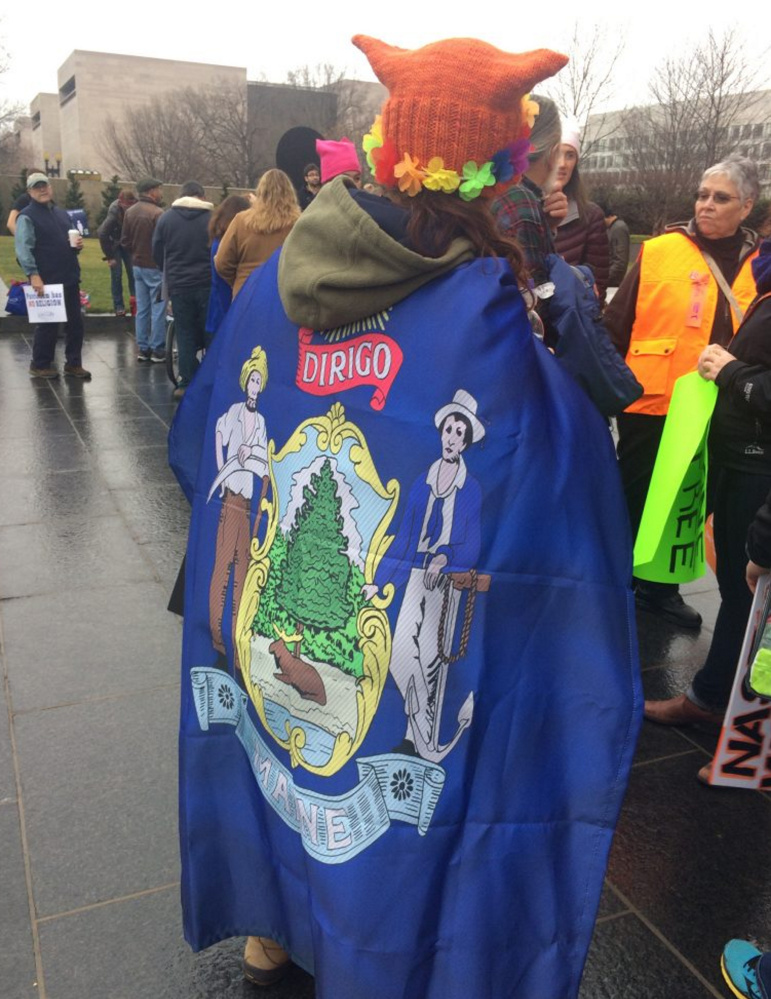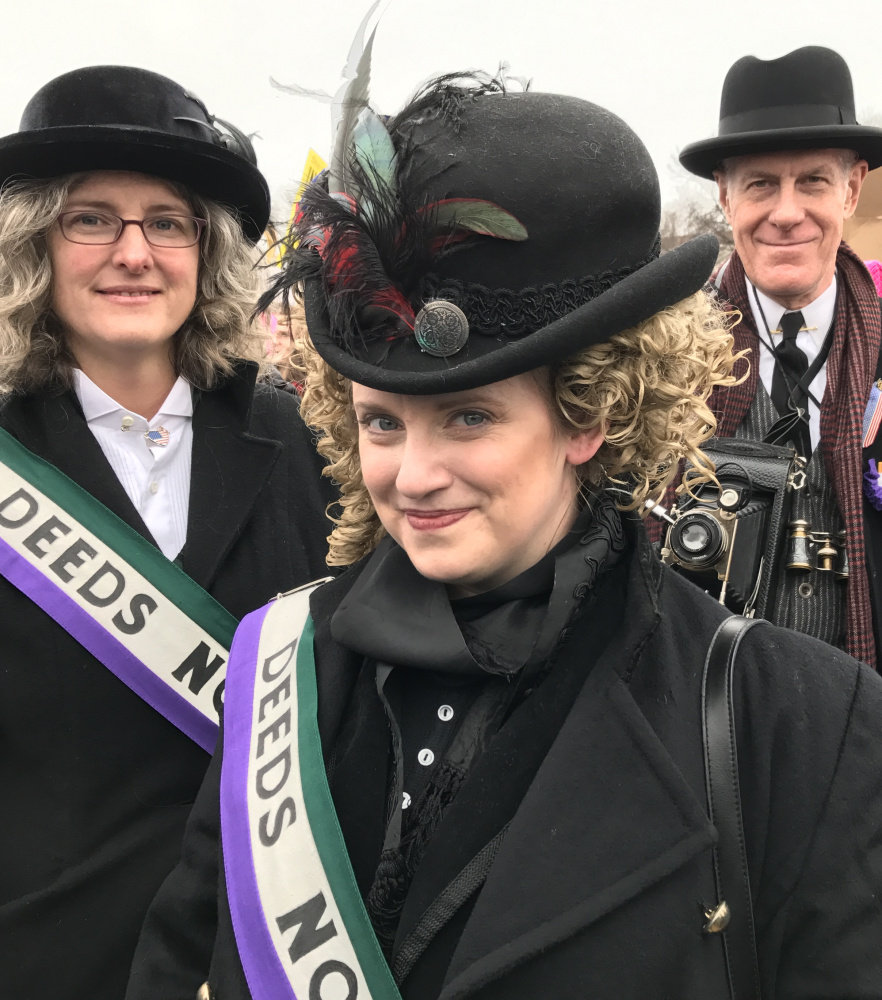Genevieve Morgan went to the nation’s capital fearful for her country. She’s coming home to Portland filled with hope after joining an estimated 4,000 Mainers on Saturday in the Women’s March on Washington.
“It was such a great antidote for the fear and despair that so many people have been feeling,” said Morgan, who helped organize the effort to mobilize people from Maine. “It was such a positive, hopeful spirit, and there were so many of us. We feel bonds of sisterhood and brotherhood, and we will move forward to continue this movement.”
Morgan, 50, traveled overnight in a bus, arriving in Washington around 10 a.m. Saturday and then marching to the Washington Mall. It was exhausting and exhilarating, she said. Organizers estimate 500,000 people or more attended the march, held one day after the inauguration of Donald Trump as president.
The march felt more like a rally because there was no room to move, said Frank O Smith of Portland, who flew to Washington on Friday with his wife and was part of a group of nine marchers.
“It was really remarkable to come up out of the Metro and onto the surface streets near the mall and experience the press of people that filled the streets,” said Smith, 69. “The sense of it was really amazing. I kept hoping to get some sort of iconic panoramic shot where you could see the crowd, but we were in the press of people from 10:30 to 3:30 and almost never had a chance to see other than the several hundred people around us.”
Like Morgan, Smith is returning to Maine with a new sense of purpose. An ardent supporter of Bernie Sanders, he felt despair after the election, and helpless. Saturday’s march reminded him why it’s important to participate in politics.
“It’s more important now than ever that we realize if this is a democracy, it cannot be a spectator sport. We have to stand up,” he said. “It was empowering to be there with this mass of people of very like minds. It felt like a significant event in history. People came from all over the country to be there to voice dissent and stand up and speak out against the election of Donald Trump.”
To turn Saturday’s action into change, participants will have to harness their energy and spirit and apply it to local issues that are important to them, said Felicia Sanchez of Nobleboro. She drove to Washington on Friday with a group of college friends. “It really renewed my commitment to buckle down and volunteer vis-a-vis the causes I believe in. There is something about being in a crowd that size that is so inspiring. It’s hard to put into words, but it is so important to know that you are not alone,” she said.
Sanchez volunteered for Hillary Clinton last fall, and plans to do grassroots work on the midterm elections in 2018 as well as local, regional and national issues. “My problem is not being able to find a cause to get behind, my problem is to winnow them down,” she said. “I feel that everything I believe in is threatened by (Trump). Immigration is important to me. The environment is important to me. We don’t have time to fiddle while Rome burns.”
RALLYING WITH STRANGERS
During the drive on Friday. Sanchez said strangers rallied with one another at rest stops and along the highways, united by knit pink hats that symbolize the women’s march. The plane ride on Friday was a similar experience, Smith said, “where 90 percent of the people on the plane were coming down for the march.”
Morgan began organizing the Maine contingent the day after the election. She had never volunteered for anything like this before, and had no idea what to expect. Her cousin Nathanial Clark made a donation from his foundation to help cover some transportation costs. He grew up in New Hampshire, and now lives in London. He joined his cousin in Washington.
“This is something we can do in the present,” he said, adding that he was happy to support the Maine contingent.
“Maine is showing its moxie,” said Kristen Farnham, 48, of Falmouth, who works at a nonprofit agency.
Early in the day, Mainers gathered at the Hirshhorn Museum and Sculpture Garden beside the mall before setting out for the rally. Soon they were overwhelmed by the crowds and many spent the day far away from the main stage where a long list of women’s leaders, celebrities and activists spoke and sang to the crowds.
Many of those taking part from Maine sported the pink hand-knit hats made by Maine knitters and crocheters as part of the Pussyhat Project – a reference to Trump’s 2005 recorded remarks about grabbing women by the genitalia without their consent – and blaze orange scarves and mittens.
Sally Struever, who drove down to stay with family members in Baltimore and took the train into Washington at 5 a.m. Saturday, said there were small crowds when she first arrived about 7 a.m. but by 8:30, the ranks had begun to swell.
“Everybody is pretty excited,” said Struever, 37, a Portland designer.
Many of the 25 buses that left Maine on Friday night made it into Washington a little late for the rally.
Michelle Fournier, 46, of Falmouth, a Falmouth Middle School French and Spanish teacher, said the mood on her bus was buoyant despite the long ride.
“It is very inspiring to be around so many powerful women making history,” Fournier said.
Erica McNally, 37, an environmental scientist from Cape Elizabeth, said the highway rest areas she stopped at on her route south were packed with people headed to the march. “Women and men wearing their pink pussy hats, high fiving, cheering and thanking the female bathroom attendants, taking pictures, hugging and chatting,” she said in an email. “Can’t wait for us all to meet up tomorrow!”
ISSUES MADE THE TRIP WORTH IT
Among the Mainers in Washington on Saturday were 54 women and one man who boarded a bus Friday night in Augusta. Those interviewed during the trip said they were committing themselves to the long journey because the issues at stake under the new administration were worth it.
Madelyn Besse, 43, of Industry traveled with her 11-year-old daughter, Amelia Tiermey, to the march.
Besse said “it didn’t take me long” to sign up for the march when she saw it on social media. She felt “heartsick” after the presidential election, she said, and thought the march would “keep me positive and hopeful.”
Morning Sentinel Staff Writer Madeline St. Amour contributed to this report.
Bob Keyes can be contacted at 791-6457 or at:
bkeyes@pressherald.com
Twitter: pphbkeyes
Beth Quimby can be contacted at 791-6363 or at:
Twitter: QuimbyBeth
Send questions/comments to the editors.










